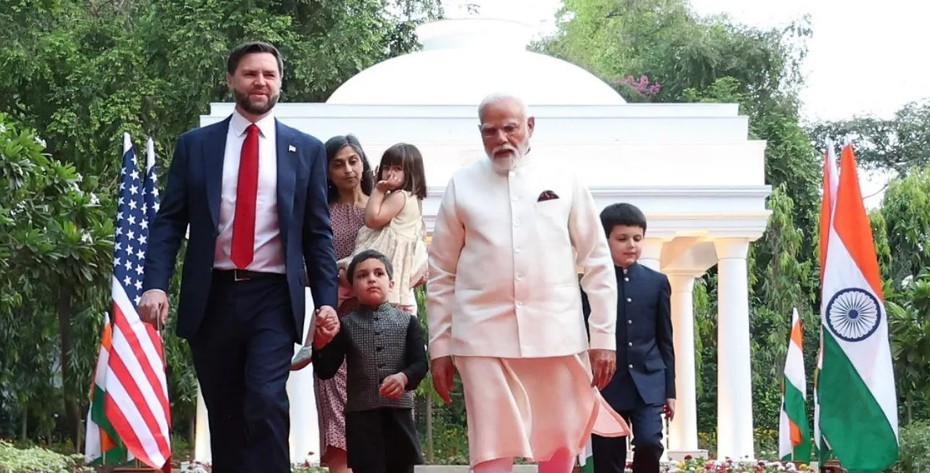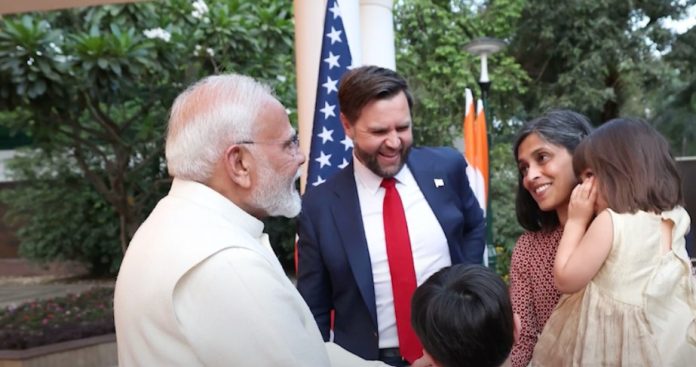In a captivating revelation that offered a rare glimpse into the personal dimensions of international diplomacy, Usha Vance, the accomplished spouse of United States Senator J.D. Vance, recently shared poignant reflections on her memorable visit to India, particularly recounting a distinctive evening spent at the official residence of Prime Minister Narendra Modi. Her recollections, articulated with a palpable sense of warmth and genuine appreciation, painted a vivid picture of Indian hospitality and the profound resonance of reconnecting with her ancestral heritage, all against the backdrop of burgeoning Indo-US strategic ties.
The visit in question took place in late 2024, as part of a bipartisan US Congressional delegation aimed at strengthening bilateral relations, exploring avenues for economic cooperation, and deepening cultural understanding between the two largest democracies. While the delegation engaged in numerous high-level meetings and toured significant landmarks, it was the personal invitation to the Prime Minister’s residence that clearly left an indelible mark on Usha Vance. For her, a daughter of Indian immigrants, this journey was more than just a diplomatic mission; it was a profound homecoming, a bridge between her American upbringing and her rich Indian roots. She had spoken before of the deep influence of her heritage, but experiencing India at such a high level, engaging with its most prominent leader, brought that connection to a new, tangible dimension.
“When we were at PM Modi’s residence,” Usha Vance began, her voice tinged with a blend of honor and fond memory, “it wasn’t just a formal meeting. It was an experience of genuine warmth and incredible hospitality.” She recalled the meticulous attention to detail, from the traditional Indian welcome that greeted them at the entrance to the serene and aesthetically pleasing ambiance of the residence itself. The air, she reminisced, felt imbued with a sense of history and quiet strength, yet it was simultaneously welcoming and comfortable, creating an atmosphere that belied the usual stiffness of high-stakes diplomatic encounters.

Her interaction with Prime Minister Modi, she elaborated, was particularly striking. She spoke of his engaging demeanor, his keen interest in understanding their perspectives, and his subtle ability to forge a personal connection even in a formal setting. The conversations, she noted, transcended typical political discourse, veering into topics that highlighted shared values and the enduring human spirit. She recalled discussions about the strength of democratic institutions, the importance of cultural preservation, and the role of innovation in shaping the future of both nations. What truly resonated with her was the Prime Minister’s emphasis on India’s ancient wisdom and its relevance in modern times, an emphasis delivered not as a lecture, but as a shared exploration.
The culinary experience at the Prime Minister’s residence was another highlight she vividly recalled. Usha Vance spoke with delight about the exquisite vegetarian meal served, a testament to India’s diverse and flavorful cuisine. She particularly savored the traditional preparations, which she found both authentic and comforting, subtly reminding her of family gatherings and the aromas from her own childhood. This aspect of the visit, seemingly minor, became a powerful symbol of cultural immersion and the universal language of shared meals. She described it as an experience that went beyond mere sustenance, becoming a moment of connection and appreciation for India’s rich gastronomic heritage.
Beyond the formal engagements, Usha Vance’s recollections underscored the essence of soft diplomacy—the power of personal interactions and cultural exchange in building bridges between nations. Her background as an Indian-American offered a unique lens through which to view the visit, making it particularly poignant. She described a sense of pride in witnessing India’s rapid progress and its confident stride on the global stage, a feeling amplified by the warmth extended by its leadership. For her, the visit was a reaffirmation of the strength of the Indian diaspora, a community that serves as a living link between India and the United States, embodying shared aspirations and values.
The significance of such a visit extends far beyond the immediate diplomatic exchanges. It serves as a powerful narrative that humanizes international relations, transforming abstract policy discussions into relatable experiences of cultural warmth and mutual respect. Usha Vance’s account contributes to a positive perception of India’s leadership and its emphasis on fostering people-to-people connections as a bedrock of strategic partnerships. In an increasingly complex global landscape, such personal anecdotes reinforce the idea that diplomatic ties are not solely built on geopolitical alignments or economic interests, but also on shared understanding, cultural appreciation, and genuine human connection.
Her reflections also subtly highlight the growing influence of the Indian diaspora in shaping foreign policy discourse in the United States. With prominent figures like Usha Vance and her husband, Senator J.D. Vance, engaging directly with Indian leadership, the unique perspectives and cultural insights of the diaspora are increasingly finding their way into the highest echelons of American decision-making. This bidirectional flow of influence enriches the bilateral relationship, ensuring that cultural understanding complements strategic imperatives.
Usha Vance’s recollection of her time at Prime Minister Modi’s residence is more than just a personal anecdote; it is a testament to the enduring power of hospitality and cultural exchange in forging stronger international bonds. It paints a picture of an India that is not only a rising global power but also a nation that values its traditions, embraces its diaspora, and extends warmth to all who seek to understand its spirit. For her, it was a moment of profound connection to her roots, and for the broader narrative of US-India relations, it underscored the deeply personal threads that weave together the tapestry of a burgeoning strategic partnership.


